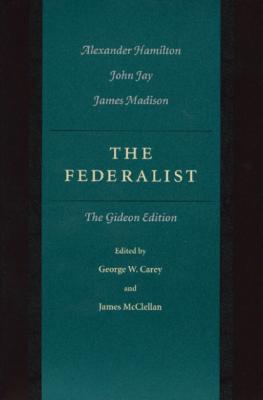The Federalist. Hamilton Alexander
Читать онлайн.| Название | The Federalist |
|---|---|
| Автор произведения | Hamilton Alexander |
| Жанр | Историческая литература |
| Серия | |
| Издательство | Историческая литература |
| Год выпуска | 0 |
| isbn | 9781614871231 |
The operations of the national government, on the other hand, falling less immediately under the observation of the mass of the citizens, the benefits derived from it will chiefly be perceived, and attended to by speculative men. Relating to more general interests, they will be less apt to come home to the feelings of the people; and, in proportion, less likely to inspire a habitual sense of obligation, and an active sentiment of attachment.
The reasoning on this head has been abundantly exemplified by the experience of all federal constitutions, with which we are acquainted, and of all others which have borne the least analogy to them.
Though the ancient feudal systems were not, strictly speaking, confederacies, yet they partook of the nature of that species of association. There was a common head, chieftain, or sovereign, whose authority extended over the whole nation; and a number of subordinate vassals, or feudatories, who had large portions of land allotted to them, and numerous trains of inferior vassals or retainers, who occupied and cultivated that land upon the tenure of fealty, or obedience to the persons of whom they held it. Each principal vassal was a kind of sovereign within his particular demesnes. The consequences of this situation were a continual opposition to the authority of the sovereign, and frequent wars between the great barons, or chief feudatories themselves. The power of the head of the nation was commonly too weak, either to preserve the public peace, or to protect the people against the oppressions of their immediate lords. This period of European affairs is emphatically styled by historians, the times of feudal anarchy.
When the sovereign happened to be a man of vigorous and warlike temper and of superior abilities, he would acquire a personal weight and influence, which answered for the time the purposes of a more regular authority. But in general, the power of the barons triumphed over that of the prince; and in many instances his dominion was entirely thrown off, and the great fiefs were erected into independent principalities or states. In those instances in which the monarch finally prevailed over his vassals, his success was chiefly owing to the tyranny of those vassals over their dependents. The barons, or nobles, equally the enemies of the sovereign and the oppressors of the common people, were dreaded and detested by both; till mutual danger and mutual interest effected an union between them fatal to the power of the aristocracy. Had the nobles, by a conduct of clemency and justice, preserved the fidelity and devotion of their retainers and followers, the contests between them and the prince must almost always have ended in their favour, and in the abridgment or subversion of the royal authority.
This is not an assertion founded merely in speculation or conjecture. Among other illustrations of its truth which might be cited, Scotland will furnish a cogent example. The spirit of clanship which was at an early day introduced into that kingdom, uniting the nobles and their dependants by ties equivalent to those of kindred, rendered the aristocracy a constant overmatch for the power of the monarch, till the incorporation with England subdued its fierce and ungovernable spirit, and reduced it within those rules of subordination, which a more rational and a more energetic system of civil polity had previously established in the latter kingdom.
The separate governments in a confederacy may aptly be compared with the feudal baronies; with this advantage in their favour, that from the reasons already explained, they will generally possess the confidence and good will of the people; and with so important a support, will be able effectually to oppose all encroachments of the national government. It will be well if they are not able to counteract its legitimate and necessary authority. The points of similitude consist in the rivalship of power, applicable to both, and in the CONCENTRATION of large portions of the strength of the community into particular DEPOSITORIES, in one case at the disposal of individuals, in the other case at the disposal of political bodies.
A concise review of the events that have attended confederate governments, will further illustrate this important doctrine; an inattention to which has been the great source of our political mistakes, and has given our jealousy a direction to the wrong side. This review shall form the subject of some ensuing papers.
PUBLIUS
Конец ознакомительного фрагмента.
Текст предоставлен ООО «ЛитРес».
Прочитайте эту книгу целиком, купив полную легальную версию на ЛитРес.
Безопасно оплатить книгу можно банковской картой Visa, MasterCard, Maestro, со счета мобильного телефона, с платежного терминала, в салоне МТС или Связной, через PayPal, WebMoney, Яндекс.Деньги, QIWI Кошелек, бонусными картами или другим удобным Вам способом.
